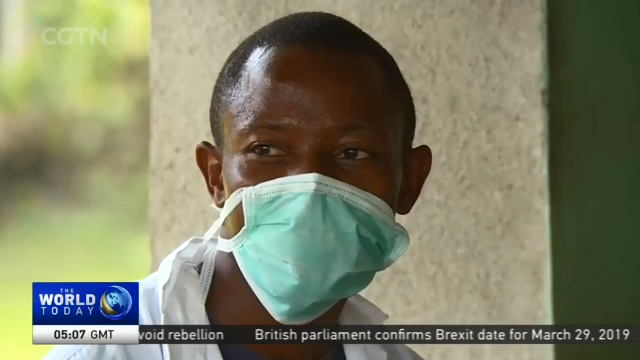
14:02, 13-Jun-2018
DRC Ebola Outbreak: Health experts express optimism about containing the virus
03:16

International health experts are expressing optimism about containing the Ebola outbreak in the Democratic Republic of Congo. World Health Organization chief Tedros Ghebreyesus -- who's currently visiting the country -- says joint efforts by the government and aid agencies have helped turn the tide against the deadly virus. Chris Ocamringa reports from one of the affected areas in the northwestern DRC.
Health workers at Mbandaka airport screen passengers to prevent the spread of Ebola. The deadly disease has changed the way people interact in this northwestern part of the DRC. And the Director General of the World Health Organization, Tedros Ghebreyesus, knows there's no more shaking of hands here. He's on a tour of a village called Itipo to check the progress made in tackling Ebola. The first case was reported in the DRC's Equateur Province last month. Twenty seven people lost their lives. The latest Ebola case was reported here last week. But authorities say the situation has improved.
DR. OLIVIER DEMOINET MEDICAL OFFICER, ARIN "At least one or two died because of Ebola and the team was completely disappointed. And since I'm working in here, we didn't see any case, new case of Ebola. "
The Congolese government is working with international agencies to contain the disease. And the progress made so far is something officials are proud of.
DR. OLY ILUNGA KALENGA DRC HEALTH MINISTER "The latest case was reported here in Itipo. We will monitor the patient for 21 days and then ensure that we get rid of this disease."
But the government is not taking any chances. Efforts have been stepped up to bring a swift end to Ebola.
CHRIS OCAMRINGA MBANDAKA, DRC "Health experts are employing a method called Ring Vaccination to stop the spread of Ebola. It involves tracking the disease by following up all people who have come into contact with confirmed cases and getting them vaccinated."
But it hasn't been easy to get to the suspected cases given the poor road network in the area. The collaboration of medics and aid agencies has nonetheless helped reduce the spread of Ebola. Some of the patients who survived the disease are impressed with the medical attention they have been given.
PAULINE EFOKI EBOLA SURVIVOR "The doctors treated us so well. They gave us food, water and strict rules about containing the disease."
Although there has been a significant improvement in checking the spread of the fatal virus, the World Health Organisation Chief says there's need for more vigilance.
TEDROS GHEBREYESUS WHO DIRECTOR-GENERAL "We have to be vigilant, and we have to continue to strengthen our surveillance. So we contain any further spread."
This is the ninth outbreak of Ebola in the DRC. The first was reported in 1976 at River Ebola in northern DRC. Chris Ocamringa, CGTN, Mbandaka, DRC.

SITEMAP
Copyright © 2018 CGTN. Beijing ICP prepared NO.16065310-3
Copyright © 2018 CGTN. Beijing ICP prepared NO.16065310-3